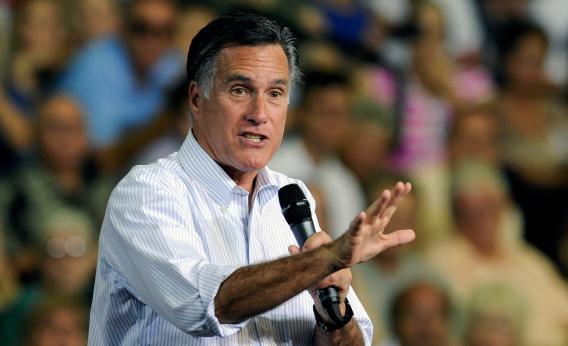As you may have heard by now, Mitt Romney released his 2011 tax returns this afternoon along with a brief summary of the federal taxes he says he paid dating back more than two decades. The release—at around 3 p.m. ET, or a few hours before a typical Friday document dump—was met quickly, and in some cases preemptively, with a blitz of criticism from those on the left, who, together, managed to hit the GOP nominee from nearly every imaginable side, including opposing angles at once.
In short, taken as an whole, his critics managed what on its face would appear to be an impossibility: arguing that Romney managed to both pay too much in taxes, and at the same time too little. For good measure, they also pulled off a second, smaller political sleight of hand, accusing Mitt and his wife of giving both too little to charity and too much.
We’ll walk you through the flurry of seemingly-but-not-necessarily contradictory shots thrown Romney’s way in one second, but first here’s a pair of quotes that are the foundation of much of the criticism that poured out over Twitter and the rest of the Web:
“I don’t pay more [in taxes] than are legally due and frankly if I had paid more than are legally due I don’t think I’d be qualified to become president. I’d think people would want me to follow the law and pay only what the tax code requires.” — Mitt Romney to ABC News at the end of July.
“I did go back and look at my taxes, and over the past 10 years I never paid less than 13 percent. I think the most recent year is 13.6 or something like that. So I paid taxes every single year.” — Mitt Romney during a South Carolina campaign swing in mid-August.
Taken together, those quotes made it more or less an impossibility that Romney was going to escape his FY2011 release without having to weather a few shots. If he would have claimed the full $4 million in charitable deductions allowable by law, his effective tax rate for this past year would have dipped below the 13-percent threshold he had already announced. But, according to some back-of-the-envelope math by the National Journal, by claiming only $2.25 million worth of deductions, he paid roughly $250,000 more in taxes than required—something he previously said would make someone unqualified for the office he is currently seeking.
Which brings us to the all-angles assault that came from the left.
Romney paid too much in taxes. The argument here, of course, isn’t that Romney shouldn’t have had to pay the taxes he did, but instead that he intentionally paid more than he had to in order to avoid being called out on his July promise of paying a 13-percent effective tax rate.
Representative one-liner: “He could hardly claim that he had done this out of the goodness of his heart, so he had to fess up that it was a purely cynical maneuver to avoid a politically dicey 9% tax rate,” wrote Mother Jones’ Kevin Drum.
Romney paid too little in taxes. This one is much more standard fare from liberals, who have long taken issue with the fact that because the bulk of Romney’s annual income comes from investment, he pays substantially less than the average American.
Representative one-liner: “Romney paid a lower effective tax rate than 2/3 of the so-called 47%? That’s mooching!” tweeted the Daily Kos’ David Waldman.
Romney gave too much/too little to charity. Here again, things get a little more complicated. Those who went with the more seldom-used charity angle are mostly angered by the fact that donations to the Mormon church are considered tax deductible. They are not, we assume, complaining that the Romneys gave more than $4 million to charity last year, a total that is substantially higher than the amount given by both the Obamas ($172,130, or 22 percent) and the Bidens ($5,540, or 1.5 percent).
Representative one-liner: “[A]ny story that talks about Romney’s charitable contributions as if the Mormon Church were a real charity is misleading its readers,” argued The Nation’s Ben Adler.
